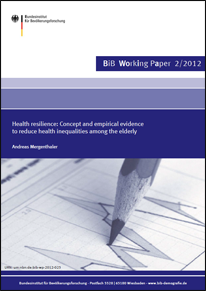Sonstige PublikationenHealth resilience. Concept and empirical evidence to reduce health inequalities among the elderly
Mergenthaler, Andreas (2012)
BiB Working Paper 2/2012. Wiesbaden: Bundesinstitut für Bevölkerungsforschung
URN: nbn:de:bib-wp-2012-025
In the face of persistent health inequalities in later life, the objective of the study is to examine whether distinct forms of health lifestyles and individual or collective social capital predict the probability of health resilience among a cohort of men and women aged 65 and older from lower social classes. A longitudinal study design based on four waves of the German Socio-Economic Panel (2002 to 2008) was employed. The study cohort included 2,075 participants. Analyses were performed using hierarchical-linear models, cluster analyses and binary logistic regressions. The main outcome measures were health-related quality of life, based on a modified SF12, and a dichotomised measure for health resilience based on the SF12 scores. A social gradient was observed for the physical health of men and for the mental health of women, respectively, with participants from lower social classes reporting lesser scores of health-related quality of life compared to participants with higher socioeconomic status. Regarding the physical resilience of elderly men, a moderate health conscious lifestyle was the most pronounced predictor (OR=9.5, p<0.1%). Social capital did not elevate the probability of physical resilience among men. Mental resilience of women was strongly associated with a health conscious lifestyle as well as a moderate health risky lifestyle (OR=4.2, p<0.1% in each case). Quantitative aspects of social capital, like an above average number of friends and close relatives, were positively associated with mental resilience of elderly women (OR=1.9, p<0.1% and OR=1.3, p<5%, respectively). The data provides evidence that health conscious as well as moderate health risky lifestyles and quantitative aspects of individual social capital serve as protective factors for health resilience among older men and women with low socioeconomic status. The findings could be used as guidelines to promote health resilience among the elderly in lower social classes and thus to reduce health inequalities in later life.

